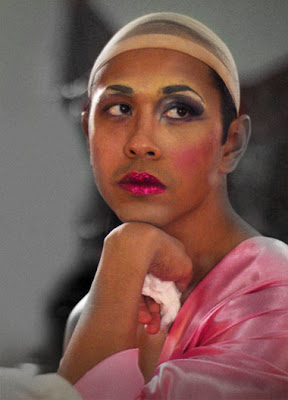What is the opposite of a “clash of cultures”? It’s when two cultures so opposed to each other that they must clash and conflict confound us as brought together they lead to unexpectedly warm and meaningful relationships.
Paper Dolls is a new play about Filipino Transgender migrants, who work in Israel looking after Jewish Orthodox elderly men in need of care. In addition to their day job they form a transvestite act (called the Paper Dolls) that is looking to break through on Tel Aviv’s vibrant night club scene. The play is a fictionalized an dramatized account of the 2006 award winning documentary film of the same name by Tomer Heymann.
Paper Dolls revolves around the relationships of the men wit each other and with the people they care for. It also shows the ambivalent relationship between the their host country Israel that allows them to come and work there. They earn enough money to send some of it home to their families in the Philippines, but are not allowed to stay on and settle in Israel, although they are loyal grateful, well integrated and highly productive members of Israeli society who have learnt to speak fluent Hebrew.
Himberg’s play is partly Cage-aux-Folles-type comedy and partly poignant drama. It raises questions about the status of migrant workers, caring for the elderly and bridging gaps that may seem unbridgeable. Most moving is the relationship between the old man Chaim (Harry Dickman) and his caregiver Sally (Francis Jue).
While all the members of the Paper Dolls have to leave Israel as their visas expire Paper Dolls is ultimately an optimistic tale that confounds our expectations and shows that common humanity can bridge great differences.
Paper Dolls is not a great or very deep play, but it is a worthwhile play, which one leaves uplifted and well entertained; moreover, it manages to make the audience think about the stereotypes and prejudices we all hold dear. Competent performances, and the songs sung in Hebrew and English add to the entertainment.
Indhu Rubasingham, the Artistic Director of the Tricycle Theatre, met writer Philip Himberg at the Sundance Theatre Festival, which just underlines the roles of Sundance and the Tricycle Theatre as much needed dynamos, encouraging creativity in the theatre. Long may they continue to do so.
http://www.tricycle.co.uk/current-programme-pages/theatre/theatre-programme-main/paper-dolls/
Paper Dolls is a new play about Filipino Transgender migrants, who work in Israel looking after Jewish Orthodox elderly men in need of care. In addition to their day job they form a transvestite act (called the Paper Dolls) that is looking to break through on Tel Aviv’s vibrant night club scene. The play is a fictionalized an dramatized account of the 2006 award winning documentary film of the same name by Tomer Heymann.
Paper Dolls revolves around the relationships of the men wit each other and with the people they care for. It also shows the ambivalent relationship between the their host country Israel that allows them to come and work there. They earn enough money to send some of it home to their families in the Philippines, but are not allowed to stay on and settle in Israel, although they are loyal grateful, well integrated and highly productive members of Israeli society who have learnt to speak fluent Hebrew.
Himberg’s play is partly Cage-aux-Folles-type comedy and partly poignant drama. It raises questions about the status of migrant workers, caring for the elderly and bridging gaps that may seem unbridgeable. Most moving is the relationship between the old man Chaim (Harry Dickman) and his caregiver Sally (Francis Jue).
While all the members of the Paper Dolls have to leave Israel as their visas expire Paper Dolls is ultimately an optimistic tale that confounds our expectations and shows that common humanity can bridge great differences.
Paper Dolls is not a great or very deep play, but it is a worthwhile play, which one leaves uplifted and well entertained; moreover, it manages to make the audience think about the stereotypes and prejudices we all hold dear. Competent performances, and the songs sung in Hebrew and English add to the entertainment.
Indhu Rubasingham, the Artistic Director of the Tricycle Theatre, met writer Philip Himberg at the Sundance Theatre Festival, which just underlines the roles of Sundance and the Tricycle Theatre as much needed dynamos, encouraging creativity in the theatre. Long may they continue to do so.
http://www.tricycle.co.uk/current-programme-pages/theatre/theatre-programme-main/paper-dolls/

